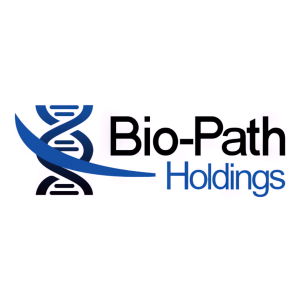Bio-Path Holdings Outlines Rationale for Development of BP1001-A as Potential Treatment for Obesity in Type 2 Diabetes Patients
Rhea-AI Summary
Bio-Path Holdings (NASDAQ:BPTH) has outlined its strategic focus on developing BP1001-A as a potential treatment for obesity in Type 2 diabetes patients. The company's decision is based on scientific evidence suggesting that downregulating growth factor receptor-bound protein 2 (Grb2) could help lower blood glucose levels by affecting insulin signaling.
The company is conducting confirmatory preclinical studies and plans to complete IND-enabling testing in Q4 2024. Simultaneously, Bio-Path announced the discontinuation of its Phase 1 clinical trial of BP1002 for refractory/relapsed lymphoma and chronic lymphocytic leukemia due to enrollment challenges in these niche indications.
Positive
- Scientific evidence supports BP1001-A's potential effectiveness in treating obesity and Type 2 diabetes
- IND-enabling testing for BP1001-A scheduled for completion in Q4 2024
- BP1001-A has demonstrated safety and tolerability in multiple human clinical studies
Negative
- Discontinuation of Phase 1 trial for BP1002 due to enrollment challenges
- Competitive landscape in lymphoma and leukemia treatment affecting trial recruitment
- Resource reallocation required from existing programs to new metabolic focus
News Market Reaction 1 Alert
On the day this news was published, BPTH declined 3.38%, reflecting a moderate negative market reaction.
Data tracked by StockTitan Argus on the day of publication.
Extensive Scientific Evidence Supporting Growth Factor Receptor Bound Protein-2 (Grb2) as Fundamental Link in Insulin Resistance
Reallocates Resources to Metabolic Program and Discontinues Enrollment in Phase 1 Study of BP1002 to Treat Relapsed/Refractory Lymphoma and Relapsed/Refractory Chronic Lymphocytic Leukemia Due to Enrollment Challenges in Niche Patient Populations
HOUSTON, Dec. 11, 2024 (GLOBE NEWSWIRE) -- Bio-Path Holdings, Inc., (NASDAQ:BPTH), a biotechnology company leveraging its proprietary DNAbilize® liposomal delivery and antisense technology to develop a portfolio of targeted nucleic acid cancer drugs, today outlined the growing body of scientific evidence that Bio-Path believes supports the development of BP1001-A for the treatment for obesity and related metabolic diseases in Type 2 diabetes patients.
Patients diagnosed with Type 2 diabetes are at high risk of developing life-threatening co-morbidities and often experience a poor quality of life. Lowering blood glucose levels is the principal goal in the treatment of patients with Type 2 diabetes. Scientific evidence suggests that by downregulating growth factor receptor-bound protein 2 (Grb2) expression, BP1001-A could help lower blood glucose level by affecting insulin signaling. Specifically, this cascade of events is led by decreasing insulin-induced mitogenic events and increasing insulin-induced metabolic events, thus leading to enhanced glucose internalization and storage. Bio-Path is conducting confirmatory preclinical studies to determine the effectiveness of BP1001-A in affecting insulin signaling and its potential as a therapeutic treatment for obese patients who have Type 2 diabetes.
“The rationale for initiating our development program for BP1001-A for the treatment of obesity is rooted in substantial scientific literature providing evidence that downregulating Grb2 expression affects insulin signaling, ultimately, leads to lower blood glucose levels. BP1001-A has been shown to downregulate Grb2 expression in preclinical models and has been shown to be safe and well-tolerated across a multitude of human clinical studies, giving us confidence in its potential to treat Type 2 diabetes and obesity,” said Peter H. Nielsen, President and Chief Executive Officer of Bio-Path. “We look forward to completing Investigational New Drug (IND)-enabling testing in the fourth quarter of 2024 and to advancing this important metabolic program in 2025.”
Scientific Rationale for BP1001-A for Treatment of Obesity – Patients diagnosed with Type 2 diabetes are at high risk of developing life-threatening co-morbidities and a poorer quality of life. Lowering blood glucose level is the principal goal in the treatment of patients with Type 2 diabetes. One potential method to manage Type 2 diabetes is to reduce body weight (Lingvay et al., 2022). Much success in weight loss has been reported for obese patients who are taking weight loss medication (Wilding et al., 2021; Frias et al., 2021). However, these medications are not as effective in inducing weight loss in obese patients who have Type 2 diabetes (Ghusn et al., 2022; Lingvay et al., 2022). Therefore, an alternative method of lowering blood glucose level is still needed for obese patients who have Type 2 diabetes.
Insulin lowers blood glucose level by activating the phosphoinositol-3 kinase (PI3K)/AKT pathway (Huang et al., 2018; Lee et al., 2022; Asiri et al., 2024). However, this insulin pathway is dysfunctional in obese patients who have Type 2 diabetes (Huang et al., 2018; Lee et al., 2022; Asiri et al., 2024). Literature suggests that Grb2 is an inhibitor of the insulin/PI3K/AKT pathway (Liu et al., 2009; Bhat et al., 2020; Ma et al., 2024). Upregulation of the Grb2 gene has been reported for patients with Type 2 diabetes (Bhat et al., 2020; Kumar et al., 2020; Alur et al., 2023). Knockdown of Grb2 expression enhanced insulin-induced AKT activity and glucose uptake in myoblasts and hepatoma cells (Liu et al., 2009; Shen et al., 2013). Furthermore, insulin sensitivity was restored in Grb2 heterozygous knockout mice fed on high fat-induced diet (Liu et al., 2009).
BP1001-A was designed to suppress Grb2 protein expression (Lara et al., 2020; Gagliardi and Tari Ashizawa, 2021). Bio-Path expects that by downregulating Grb2 expression, BP1001-A will lower blood glucose level by enhancing insulin-mediated AKT activation and glucose uptake and storage. Bio-Path is conducting preclinical studies to determine the effectiveness of BP1001-A in affecting insulin signaling and its potential as a therapeutic for obese patients who have Type 2 diabetes.
Resource Allocation – Separately, the Company announces its plans to reallocate resources toward its advancing metabolic program and to discontinue its Phase 1 clinical trial evaluating BP1002 as a treatment for refractory/relapsed lymphoma and refractory/relapsed chronic lymphocytic leukemia. This decision was based on enrollment challenges in these niche indications, particularly given the crowded development landscape that includes multiple competing trials.
About Bio-Path Holdings, Inc.
Bio-Path is a biotechnology company developing DNAbilize®, a novel technology that has yielded a pipeline of RNAi nanoparticle drugs that can be administered with a simple intravenous infusion. Bio-Path’s lead product candidate, prexigebersen (BP1001, targeting the Grb2 protein), is in a Phase 2 study for blood cancers, and BP1001-A, a drug product modification of prexigebersen, is in a Phase 1/1b study for solid tumors. The Company’s second product, BP1002, which targets the Bcl-2 protein, is being evaluated for the treatment of blood cancers and solid tumors, including acute myeloid leukemia. In addition, an IND application is expected to be filed for BP1003, a novel liposome-incorporated STAT3 antisense oligodeoxynucleotide developed by Bio-Path as a specific inhibitor of STAT3.
For more information, please visit the Company's website at http://www.biopathholdings.com.
Forward-Looking Statements
This press release contains forward-looking statements that are made pursuant to the safe harbor provisions of the federal securities laws. These statements are based on management's current expectations and accordingly are subject to uncertainty and changes in circumstances. Any express or implied statements contained in this press release that are not statements of historical fact may be deemed to be forward-looking statements. Any statements that are not historical facts contained in this release are forward-looking statements that involve risks and uncertainties, including Bio-Path’s ability to raise needed additional capital on a timely basis in order for it to continue its operations, have success in the clinical development of its technologies, the timing of enrollment and release of data in such clinical studies, the accuracy of such data, limited patient populations of early stage clinical studies and the possibility that results from later stage clinical trials with much larger patient populations may not be consistent with earlier stage clinical trials, the maintenance of intellectual property rights, that patents relating to existing or future patent applications will be issued or that any issued patents will provide meaningful protection of our drug candidates, the impact, risks and uncertainties related to global pandemics, including the COVID-19 pandemic, and actions taken by governmental authorities or others in connection therewith, and such other risks which are identified in Bio-Path's most recent Annual Report on Form 10-K, in any subsequent quarterly reports on Form 10-Q and in other reports that Bio-Path files with the Securities and Exchange Commission from time to time. These documents are available on request from Bio-Path Holdings or at www.sec.gov. Bio-Path disclaims any intention or obligation to update or revise any forward-looking statements, whether as a result of new information, future events or otherwise.
Contact Information:
Investors
Will O’Connor
Stern Investor Relations, Inc.
212-362-1200
will@sternir.com
Doug Morris
Investor Relations
Bio-Path Holdings, Inc.
832-742-1369
Cited Literature
Alur V, Raju V, Vastrad B, et al. Bioinformatics analysis of next generation sequencing data identifies molecular biomarkers associated with Type 2 diabetes mellitus. Clinical Medicine Insights: Endocrinology and Diabetes (2023) 16: 1–22.
Asiri A, Al Qarni A, Bakillah A. The interlinking metabolic association between type 2 diabetes mellitus and cancer: molecular mechanisms and therapeutic insights. Diagnostics (2024) 14: 2132. https://doi.org/10.3390/ diagnostics14192132
Bhat M, Pasini E, Das A, et al. Diabetogenic effects of immunosuppression: an integrative analysis. Transplantation (2020) 104: 211–221.
Frias JP, Davies MJ, Rosenstock J, et al. Tirzepatide versus semaglutide once weekly in patients with type 2 diabetes. N Engl J Med (2021) 385: 503-515. doi: 10.1056/NEJMoa2107519
Gagliardi M, Tari Ashizawa A. The challenges and strategies of antisense oligonucleotide drug delivery. Biomedicines (2021) 9: 433. doi: 10.3390/biomedicines9040433
Ghusn W, De la Rosa A, Sacoto D, et al. Weight loss outcomes associated with semaglutide treatment for patients with overweight or obesity. JAMA Network Open (2022) 5(9): e2231982. doi:10.1001/jamanetworkopen.2022.31982
Huang X, Liu G, Guo J, et al. The PI3K/AKT pathway in obesity and type 2 diabetes. Int J Biol Sci (2018) 14: 1483-1496. doi: 10.7150/ijbs.27173
Kumar U, Rajan B, Kumar T, et al. Involvement of essential signaling cascades and analysis of gene networks in diabesity. Genes (2020) 11: 1256. doi:10.3390/genes11111256
Lara OD, Bayraktar E, Amero P, et al. Therapeutic efficacy of liposomal Grb2 antisense oligodeoxynucleotide (L-Grb2) in preclinical models of ovarian and uterine cancer. Oncotarget (2020) 11: 2819-2833. doi: 10.18632/oncotarget.27667
Lee S-H, Park S-Y, Choi CS. Insulin resistance: from mechanisms to therapeutic strategies. Diabetes Metab J (2022) 46: 15-37. https://doi.org/10.4093/dmj.2021.0280
Lingvay I, Sumithran P, Cohen RV, et al. Obesity management as a primary treatment goal for type 2 diabetes: time to reframe the conversation. Lancet (2022) 399: 394–405. Published online September 30, 2021 https://doi.org/10.1016/ S0140-6736(21)01919-X
Liu X, Liu M, Zhang J, et al. Downregulation of Grb2 contributes to the insulin-sensitizing effect of calorie restriction. Am J Physiol Endocrinol Metab (2009) 296: E1067–E1075. First published February 24, 2009; doi:10.1152/ajpendo.90714.2008
Ma J, Dong Y, Liu J, et al. The role of GRB2 in diabetes, diabetes complications and related disorders. Diabetes Obes Metab (2024) 1–12. doi: 10.1111/dom.16015
Shen X, Miao Y, Feng R, et al. Suppression of Grb2 expression improved hepatic steatosis, oxidative stress, and apoptosis induced by palmitic acid in vitro partly through insulin signaling alteration. In Vitro Cellular and Developmental Biology (2013) 49: 576-582.
Wilding JPH, Batterham RL, Calanna S, et al. Once-weekly semaglutide in adults with overweight or obesity. N Engl J Med (2021) 384: 989-1002. doi: 10.1056/NEJMoa2032183







